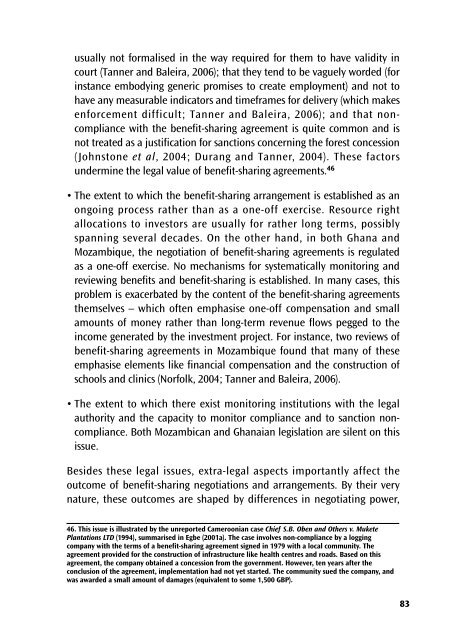Legal empowerment for local resource control
Legal empowerment for local resource control
Legal empowerment for local resource control
You also want an ePaper? Increase the reach of your titles
YUMPU automatically turns print PDFs into web optimized ePapers that Google loves.
usually not <strong>for</strong>malised in the way required <strong>for</strong> them to have validity in<br />
court (Tanner and Baleira, 2006); that they tend to be vaguely worded (<strong>for</strong><br />
instance embodying generic promises to create employment) and not to<br />
have any measurable indicators and timeframes <strong>for</strong> delivery (which makes<br />
en<strong>for</strong>cement difficult; Tanner and Baleira, 2006); and that noncompliance<br />
with the benefit-sharing agreement is quite common and is<br />
not treated as a justification <strong>for</strong> sanctions concerning the <strong>for</strong>est concession<br />
(Johnstone et al, 2004; Durang and Tanner, 2004). These factors<br />
undermine the legal value of benefit-sharing agreements. 46<br />
The extent to which the benefit-sharing arrangement is established as an<br />
ongoing process rather than as a one-off exercise. Resource right<br />
allocations to investors are usually <strong>for</strong> rather long terms, possibly<br />
spanning several decades. On the other hand, in both Ghana and<br />
Mozambique, the negotiation of benefit-sharing agreements is regulated<br />
as a one-off exercise. No mechanisms <strong>for</strong> systematically monitoring and<br />
reviewing benefits and benefit-sharing is established. In many cases, this<br />
problem is exacerbated by the content of the benefit-sharing agreements<br />
themselves – which often emphasise one-off compensation and small<br />
amounts of money rather than long-term revenue flows pegged to the<br />
income generated by the investment project. For instance, two reviews of<br />
benefit-sharing agreements in Mozambique found that many of these<br />
emphasise elements like financial compensation and the construction of<br />
schools and clinics (Norfolk, 2004; Tanner and Baleira, 2006).<br />
The extent to which there exist monitoring institutions with the legal<br />
authority and the capacity to monitor compliance and to sanction noncompliance.<br />
Both Mozambican and Ghanaian legislation are silent on this<br />
issue.<br />
Besides these legal issues, extra-legal aspects importantly affect the<br />
outcome of benefit-sharing negotiations and arrangements. By their very<br />
nature, these outcomes are shaped by differences in negotiating power,<br />
46. This issue is illustrated by the unreported Cameroonian case Chief S.B. Oben and Others v. Mukete<br />
Plantations LTD (1994), summarised in Egbe (2001a). The case involves non-compliance by a logging<br />
company with the terms of a benefit-sharing agreement signed in 1979 with a <strong>local</strong> community. The<br />
agreement provided <strong>for</strong> the construction of infrastructure like health centres and roads. Based on this<br />
agreement, the company obtained a concession from the government. However, ten years after the<br />
conclusion of the agreement, implementation had not yet started. The community sued the company, and<br />
was awarded a small amount of damages (equivalent to some 1,500 GBP).<br />
83

















